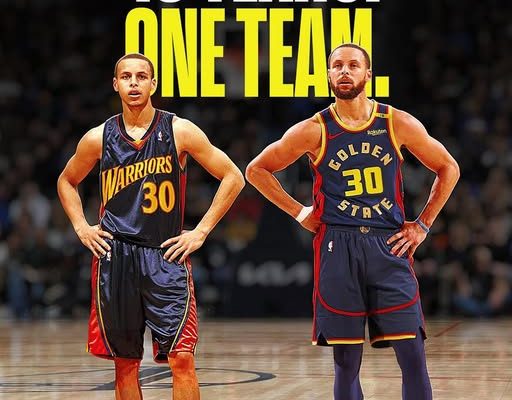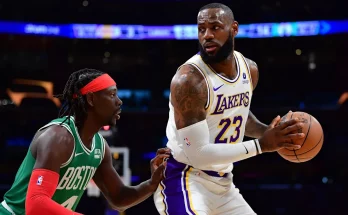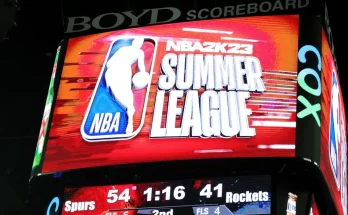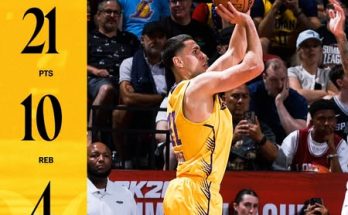In a modern NBA defined by trades, superteams, and constant player movement, Stephen Curry’s journey with the Golden State Warriors stands as a remarkable testament to something increasingly rare—loyalty. For 16 seasons, Curry has worn just one jersey, embraced one city, and given everything to a franchise that once lingered in obscurity. From the moment he was drafted seventh overall in 2009, through injuries, criticism, and ultimately glory, Curry’s presence has transformed the Warriors from a laughingstock into one of the most iconic dynasties in basketball history.
He arrived with little fanfare compared to others in his class. Questions about his size, his defense, and whether his game would translate from Davidson to the NBA dominated early headlines. But what no scout could measure was his resilience, his work ethic, and the chip he carried from being overlooked. That quiet fire never left him—it only evolved into greatness. What started as a skinny kid with a smooth jumper turned into the revolutionary engine behind the NBA’s three-point era. Curry didn’t just play the game—he changed it.
His early years in Golden State weren’t easy. The team was rebuilding, the roster inconsistent, and Curry’s own ankles betrayed him more than once. Multiple surgeries and rehab stints led to whispers that he might never hold up long-term. But the Warriors believed. More importantly, Steph believed. He doubled down, pushed through, and finally began to shine around 2012-13, right as the team started to take shape with fellow sharpshooter Klay Thompson and versatile forward Draymond Green.
What followed was nothing short of historic. From 2015 to 2019, the Warriors made five straight NBA Finals appearances, winning three titles during that stretch. Curry picked up two MVPs, including the first-ever unanimous MVP in league history. He shattered the record books with his barrage of deep threes and played the game with a joy that inspired a generation. Children across the globe began mimicking his pregame tunnel shots, his quick release, and his humble demeanor.
Yet through all the fame, Curry remained grounded. He didn’t lobby for a bigger market. He didn’t flirt with greener pastures. As players chased max contracts and championship shortcuts, Steph planted his flag in the Bay Area. He didn’t run when Kevin Durant arrived in 2016—he adjusted, took a backseat at times, and won two more titles. He didn’t complain when injuries ravaged the team in 2020, sending the Warriors plummeting in the standings. Instead, he returned from his own injury, played with rookies and G-Leaguers, and still nearly dragged them into the playoffs.
That’s the thing about Curry. Winning matters. Legacy matters. But what matters most to him is doing it the right way—with the team that believed in him from the start. In a climate where stars team-hop for better odds, Steph is still chasing rings with the franchise he built from the ground up. That kind of loyalty is almost extinct in professional sports. And it’s why fans across the league—even those who root against the Warriors—respect what he stands for.
What makes his story even more incredible is how deeply intertwined it is with the identity of the Warriors themselves. Before Steph, Golden State was irrelevant—a franchise stuck in mediocrity for decades. Since his arrival, they’ve become the blueprint for sustainable excellence. His presence elevated not just the team, but the culture. And his leadership—always calm, always composed—helped the organization navigate through egos, adversity, and massive expectations.
Off the court, Curry’s impact is equally profound. He’s been a beacon for community outreach, philanthropy, and youth development. Through his foundation and public work, he’s focused on literacy, equality, and social justice. He’s turned his platform into something far greater than sports, becoming a role model for millions not just because he wins, but because he leads with humility and grace.
Even now, in his 16th season, he’s not slowing down. He remains one of the league’s most lethal scorers, still hits game-winners with ease, and still dances after pulling up from 30 feet. More importantly, he still believes in the Warriors—still believes they can win. He doesn’t chase narratives. He writes his own. And that’s what separates him from almost every other player in the modern era.
Stephen Curry is the longest-tenured active player with one franchise. That in itself is a feat. But what makes it magical is that those years weren’t spent coasting or cashing checks. They were filled with sweat, setbacks, sacrifice, and success. From 23-win seasons to 73-win history. From career-threatening ankle injuries to record-setting MVP seasons. From a bright-eyed rookie to a seasoned leader, Curry’s evolution is a mirror to the Warriors’ own journey from irrelevance to a dynasty.
And the dynasty isn’t over. Curry is still writing chapters. He still wants more. More wins. More banners. More memories with the only team he’s ever known. He’s not content with four rings. He’s hungry. Not just for legacy, but for the right legacy—one built on roots, not rentals. His career arc could’ve taken so many turns. He could’ve walked when things got tough, like so many others. But he didn’t. And that’s why his legacy transcends basketball.
In a league where stars are often judged by how many teams they’ve helped win, Curry’s defining trait is how he stayed. Through injuries, roster turnover, coaching changes, and media criticism—he stayed. And he didn’t just survive, he thrived. He became the heart and soul of a franchise, a city, and a generation of fans who saw in him something more than just talent. They saw devotion. They saw character. They saw greatness built on loyalty, not convenience.
There’s a reason why Chase Center erupts every time he touches the ball. There’s a reason kids still wear No. 30 jerseys with pride, even after a decade and a half. There’s a reason he gets MVP chants in opposing arenas. It’s not just the threes or the trophies. It’s the story. The symbolism. In Curry, fans see the rare athlete who chose the long road, the hard road—the one that builds something lasting.
And when he finally walks away from the game, whenever that may be, there won’t be a dry eye in the house. Because the NBA won’t just be saying goodbye to one of its greatest shooters—it’ll be saying goodbye to a symbol. A reminder that in a world of change, there’s still room for commitment. That greatness isn’t just about stats, but about sticking when it’s tempting to leave.
Stephen Curry’s 16-year love story with the Golden State Warriors is unlike anything else in the modern era. It’s Shakespearean in its arc—rising action, drama, triumph, and still unfolding. One team. One city. One jersey. Through every high and low, he’s been there, hand over heart, with the same boyish grin and burning fire.
And that’s what makes him more than just a basketball player. He’s a symbol of what it means to believe. To build. To belong. One franchise. One family. One forever.



